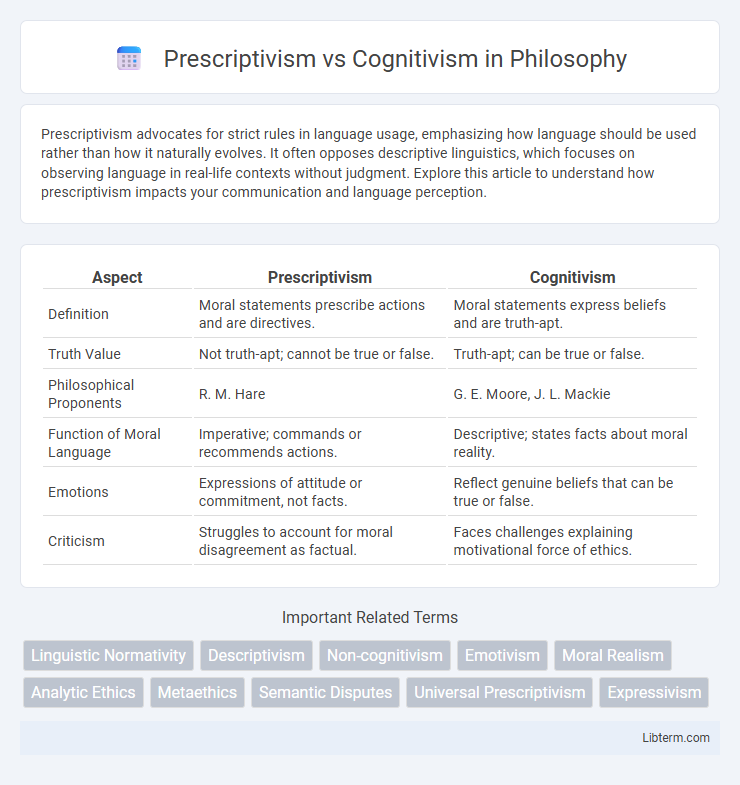Prescriptivism advocates for strict rules in language usage, emphasizing how language should be used rather than how it naturally evolves. It often opposes descriptive linguistics, which focuses on observing language in real-life contexts without judgment. Explore this article to understand how prescriptivism impacts your communication and language perception.
Table of Comparison
| Aspect | Prescriptivism | Cognitivism |
|---|---|---|
| Definition | Moral statements prescribe actions and are directives. | Moral statements express beliefs and are truth-apt. |
| Truth Value | Not truth-apt; cannot be true or false. | Truth-apt; can be true or false. |
| Philosophical Proponents | R. M. Hare | G. E. Moore, J. L. Mackie |
| Function of Moral Language | Imperative; commands or recommends actions. | Descriptive; states facts about moral reality. |
| Emotions | Expressions of attitude or commitment, not facts. | Reflect genuine beliefs that can be true or false. |
| Criticism | Struggles to account for moral disagreement as factual. | Faces challenges explaining motivational force of ethics. |
Understanding Prescriptivism: A Brief Overview
Prescriptivism in linguistics emphasizes enforcing strict rules and standards for language use, advocating for grammatical correctness and clarity based on established norms. It prioritizes authoritative guidance on language, often resisting changes that deviate from traditional grammar or usage conventions. This approach is commonly applied in educational settings, editorial work, and formal writing contexts to maintain linguistic consistency and avoid ambiguity.
Defining Cognitivism in Linguistics and Philosophy
Cognitivism in linguistics and philosophy asserts that language reflects mental states and truth-apt beliefs, emphasizing the role of cognitive processes in meaning and understanding. It contrasts with prescriptivism by focusing on descriptive accuracy rather than normative rules, supporting that statements can be objectively true or false based on their correspondence to mental representations. Key figures like Frege and Tarski shaped cognitivist theories, linking language semantics to logic and psychological reality.
Historical Origins of Prescriptivism and Cognitivism
Prescriptivism traces its historical origins to ancient Greek philosophers like Plato, who emphasized ideal forms and normative rules in language and ethics, influencing linguistic and moral prescriptions. Cognitivism emerged later in the 20th century within the cognitive sciences and philosophy of mind, rooted in the works of thinkers such as Noam Chomsky and Jerry Fodor, emphasizing mental representations and knowledge acquisition. Both paradigms diverge in foundational assumptions, with prescriptivism focusing on how things ought to be, while cognitivism centers on how knowledge is structured and processed.
Key Differences Between Prescriptivism and Cognitivism
Prescriptivism emphasizes the enforcement of fixed linguistic rules and norms, prioritizing how language ought to be used, while cognitivism centers on understanding the mental processes underlying language acquisition and comprehension. Prescriptivists often focus on correctness and standardized usage in grammar and vocabulary, whereas cognitivists investigate how language reflects thought, perception, and cognitive functions. The key difference lies in prescriptivism's normative approach versus cognitivism's descriptive and psychological exploration of language.
The Role of Language Norms in Prescriptivism
Prescriptivism emphasizes strict adherence to language norms, viewing them as essential rules that maintain clarity, correctness, and effective communication within a speech community. Language norms in prescriptivism function as authoritative guidelines that dictate proper grammar, vocabulary, and usage, often grounded in historical, educational, or cultural standards. These norms serve to preserve linguistic purity, prevent misunderstanding, and uphold the perceived prestige of a language.
Cognitivism: The Emphasis on Mental Processes
Cognitivism emphasizes the role of mental processes such as perception, memory, and problem-solving in understanding language and behavior, contrasting with Prescriptivism's focus on rules and correctness. It views the mind as an active processor that interprets and organizes information, highlighting cognitive functions like attention and mental representation. This approach drives research in artificial intelligence, educational psychology, and linguistics by modeling how humans acquire, store, and retrieve knowledge.
Arguments in Favor of Prescriptivism
Prescriptivism argues that moral statements function as commands or prescriptions, guiding behavior rather than merely describing facts. Advocates emphasize moral language's role in motivating actions and regulating social conduct, highlighting its practical utility. The approach addresses moral disagreement by framing it in terms of conflicting prescriptions rather than objective truth claims, strengthening its interpretative power.
Arguments Supporting Cognitivism
Cognitivism argues that moral statements express objective truths and can be true or false based on factual evidence, contrasting with prescriptivism's focus on commands or prescriptions. Proponents highlight that moral disagreements resemble factual disputes, implying that ethical claims have truth values independent of individual attitudes. Empirical studies in moral psychology support cognitivism by demonstrating consistent moral reasoning patterns across cultures, reinforcing the notion that moral judgments reflect cognitive evaluations rather than mere expressions of preference.
Practical Implications: Education and Communication
Prescriptivism in education emphasizes strict adherence to grammatical rules and standardized language, which can enhance clarity but may limit creative expression and adaptability in diverse communication contexts. Cognitivism promotes understanding language as a mental process, encouraging teaching methods that foster comprehension, critical thinking, and contextual language use, thereby improving communicative competence in real-world interactions. Emphasizing cognitive approaches supports adaptive communication skills essential for effective learning, social interaction, and professional environments.
Bridging the Gap: Towards a Balanced Perspective
Prescriptivism emphasizes strict rules and normative standards in language use, while cognitivism focuses on understanding language as a mental process reflecting human cognition. Bridging the gap between these approaches involves recognizing the value of prescriptive guidelines for clarity and social coherence alongside cognitive insights into language acquisition and processing. Integrating both perspectives fosters a balanced framework that respects linguistic norms without disregarding the dynamic, evolving nature of human communication.
Prescriptivism Infographic

 libterm.com
libterm.com